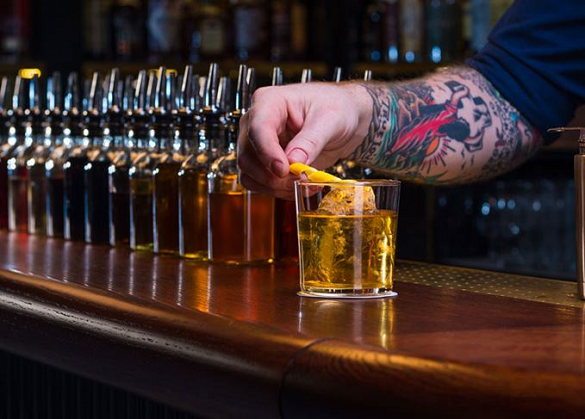Mask, App, Scotch! How Whisky Sales Will Fare as Pubs and Bars Reopen
With UK pubs, bars and restaurants now preparing to reopen after 13 months of almost unbroken lockdown, what will post-Covid drinking mean for Scotch whisky's on-trade sales, asks Richard Woodard for WhiskyInvestDirect...
SHARING a dram or two in a crowded bar used to be one of life's everyday joys. Thanks to the Covid-19 pandemic, it has become a health hazard.
Meeting friends for a drink has been forbidden in the UK since March 2020, except for a brief summer/autumn respite robbed of much of its convivial pleasure by the need for face masks and social distancing.
Now on-trade venues are preparing to open their doors again. However, for the pubs, bars and restaurants that do so much to oil the social wheels of the world we live in, the reopening regulations in the UK are mind-bogglingly complex.
You'll find the cans and cannots for going to the pub when it reopens listed at the bottom below. And after digesting all of those rules, who needs a drink?
Anyone selling Scotch whisky to the world certainly does following the events of 2020.

Scotch is one of the world's great social lubricants, and the on-trade is its natural habitat. No surprise that Scotch shipments to Spain, that bastion of bars and late-night drinking dens, plummeted by 40% last year.
But there's more to bars than shifting wagonloads of J&B and Coke. "The on-trade is just a great way for people to discover the entirety of what we have to offer, with the recommendation of a really good bartender," points out Kieran Healey-Ryder, head of whisky discovery at Whyte & Mackay.
"Bars like The Connaught and Milroys [in London] are really important to us at the premium end. What the staff can do with whiskies in those accounts is wonderful – and one bartender can give us an insight from 1,000 consumers. And multiple pubs in the UK – Marstons is a really important customer – give us a route to consumers at scale."
It's often said that crises both magnify and accelerate underlying trends. For Scotch, the tendency to "drink less but better" in mature markets like the UK could intensify as a result of people splashing out on premium products to drink at home during lockdown. Bad news for cheaper blends perhaps, but a boon for single malts.
Neil Boyd, UK MD for Ian Macleod Distillers (IMD), reports that a combination of retail sampling, online tutored tastings and explosive ecommerce growth has been a huge benefit to the company's malts – Glengoyne, Tamdhu and Smokehead.
"This...will pay dividends post-Covid," he adds, "as I believe many consumers will stick with us, and we will be better-placed to win listings in the on-trade."

Boyd reckons the on-trade accounted for 15-20% of IMD's UK branded whisky sales before the pandemic – and predicts that it could take up to two years to recover that lost business.
There's no escaping the desperate impact of Covid-19 on the hospitality trade, but few in the industry believe the key role of pubs and bars in building brands and drawing consumer attention to new products will change drastically in the long term.
"I believe the on-trade is incredibly resilient, demonstrated by some wonderful initiatives by bars in lockdown," says David McLauchlan, key account manager for Glen Moray, the single malt owned by French group La Martiniquaise. "Of course, the trade has taken a huge hit over the past year, and there is a long road to recovery ahead. However, bars are still the perfect shop window for brands to bring their personality to life, providing a captive audience when their doors finally reopen."
But what about consumer psychology? After a year of home cocktail-making and Zoom drinks, will people really return to pubs and bars in large numbers?
"It's true that people have become rock stars in their own living rooms, making these fantastic cocktails," says Healey-Ryder at Whyte & Mackay.
"The drink makes the moment, but it isn't the sole reason why you would choose to go out. You go out to be surrounded by other people. You go out for the environment, the experience, the service and the talent behind the bar. That's what people want to go back for."
And this yearning for the full drinking out experience can only bode well for Scotch, he believes.
"At the premium end, the mixologists will still be there – the likes of Gleneagles and Milroys – and single malt will come out on top," Healey-Ryder says. "There's a thing that single malt has that other categories don't have, which is that there's a whole world of flavour to explore. That feels very positive for the future of Scotch whisky."
UK pub reopening rules
| England | The hospitality industry can serve alcohol outside from 12 April but only if you arrive wearing a mask, and staff must then get everyone's personal details if they haven't scanned the venue's Test and Trace QR code on their phone. You must remain seated at your table to order and consume, and only in a group of up to six (or maybe more if there's only two households present). Indoors service should resume 17 May, subject perhaps to the growing row over Vaccine Passports. |
| Scotland | Pubs, bars and restaurants can already open on those islands under Tier 3 restrictions, but no alcohol is allowed and the venue must close at 6pm. Everywhere else is shut until 26 April, when they can serve alcohol outside (only until 10pm) and non-alcoholic drinks indoors (kicking out at 8pm) while weddings and funerals must also stay dry, but all depending on which Tier your area then comes under. The rules are scheduled to ease further from 17 May (but with 10:30 closing). |
| Wales | Also nothing happening until 26 April when you can get a drink outside, and possibly inside from the Whit Bank Holiday weekend at the end of May. But there won't be any curfew or restrictions on normal opening hours (and from 12 April you will be able to cross the border to England's easier rules anyway). Masks, social distancing and the 2-metre rule all remain in place. |
| Northern Ireland | Stormont has yet to put any dates on reopening (the Executive is reviewing things on 15 April and then 13 May) but you'll need to order food when getting a drink at Steps 3 and 4 of the current 5-step pathway, and the Rule of 6 won't be lifted until all restrictions finally end, with no more than two households meeting in a group. |

Richard Woodard has been writing about spirits and wine for 20 years, editing and contributing to a number of magazines and websites, including Decanter, The Spirits Business, just-drinks.com and Club Oenologique. He was also one of the founding editors of Scotchwhisky.com.




